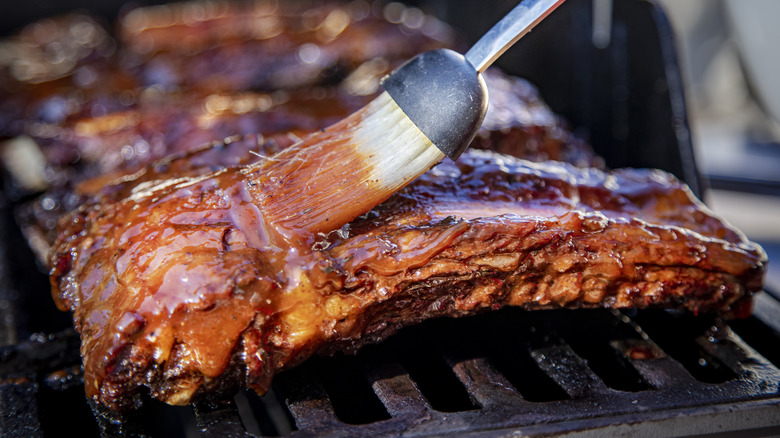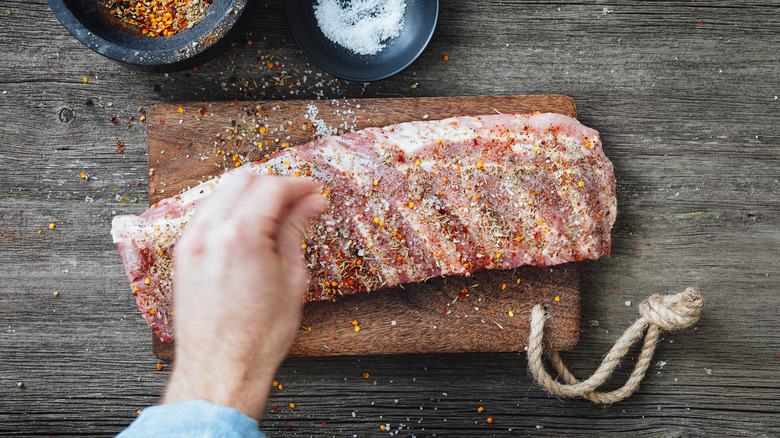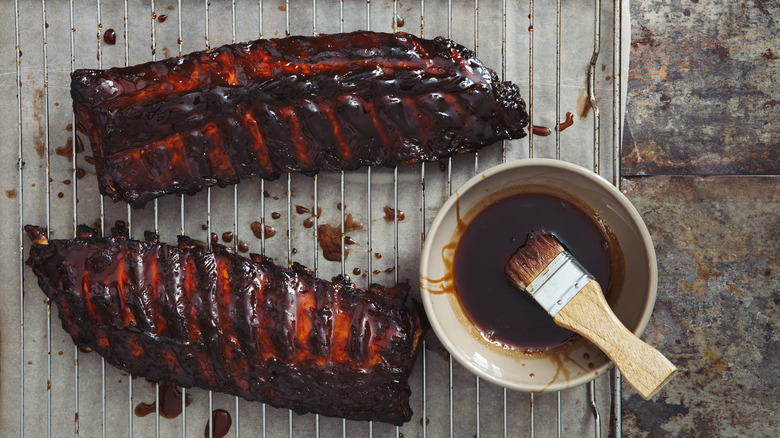The Saucy Tip You Should Know Before Grilling Ribs
Whether you're making pork or beef ribs, nailing this beloved barbecue food is likely top of mind for any aspiring home pitmaster. While there are tons of tips out there on mastering ribs, there's one mistake that many beginners tend to make time and time again: adding their barbecue sauce too early.
Sure, slathering on your barbecue sauce at the very beginning of grilling — or even marinating your ribs in barbecue sauce — might seem like a no-brainer, but it's actually more beneficial to dose your ribs in their delicious sticky dressing in the final stages of cooking. This is because since ribs take so long to cook (usually between one and three hours, depending on the size), adding the sauce too early runs the risk of it burning.
Instead, add the barbecue sauce in the final 20 to 30 minutes of grilling. This will give it a little time to thicken up and create that signature stickiness that everybody goes crazy for. Official home pitmaster, at your service.
Ideas for infusing flavor into your ribs
Since adding barbecue sauce at the end of grilling is ideal, you may wonder how to ensure your ribs are packed with rich flavor from the beginning. That's where marinades and spice rubs come in. We suggest trying both and picking your favorite — it'll be quite the delicious science project.
Once you get your ribs, you may notice a thick membrane wrapped around them. Remove it by sliding a knife underneath and pulling it off to ensure that any marinades or spices can penetrate the meat. You can opt to use a dry rub, which is a blend of spices and herbs that you massage into the ribs before cooking. A wet rub is similar to a dry rub but usually contains a little liquid, like honey or beer. You can even consider adding orange juice to your ribs' wet rub for a sweet and tangy twist that your guests will love. One benefit of spice rubs is that they can help ribs achieve a beautiful crust.
Marinades, on the other hand, often consist of olive oil, acid (like lemon juice), and spices that work together to both flavor and tenderize the meat. A marinade is usually added in advance (like the night before) to work its magic.
Choosing the right barbecue sauce for your ribs
There are so many different barbecue sauce styles that it can be overwhelming to pick which one you want to use. Kansas City-style barbecue sauce is likely one that you're already familiar with. It's thick, sweet, and smoky thanks to the mixture of ketchup and molasses (along with a ton of yummy spices). St. Louis-style barbecue sauce is similar to Kansas City's, but a bit tangier due to the heavy hand of apple cider vinegar.
In Memphis, however, folks prefer starting their ribs with a dry rub filled with warm spices and balanced with a sweet and tangy tomato-based barbecue sauce. Texas-style sauce is a little more old-fashioned — and thinner — than some other options. It's traditionally made with vegetables like celery, onions, and garlic, and gets its rich flavor from incorporating beef drippings. For a unique sauce, Alabama's white sauce is just that: white. Thanks to the mayo base, this sauce is as creamy as it is zesty.
Considered the oldest barbecue sauce in America, Eastern North Carolina barbecue sauce dates back to the 1600s, and has a flavor profile that's both spicy and acidic. One of this sauce's biggest differentiators from other regions is that there are no tomatoes found in the recipe. Instead, this thin sauce is traditionally made with a combination of apple cider vinegar, red pepper flakes, salt, and pepper.



